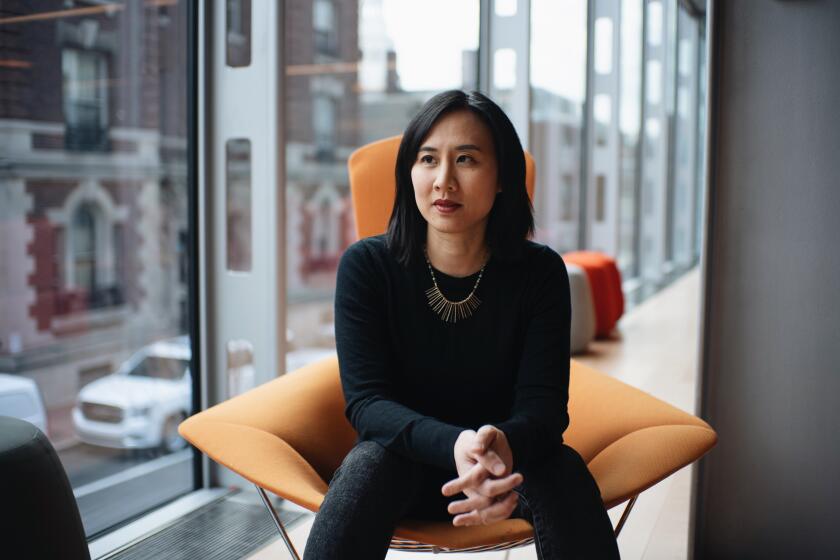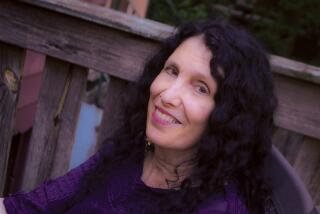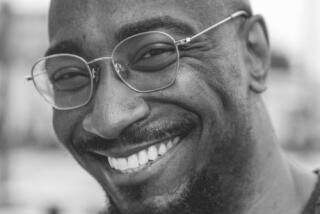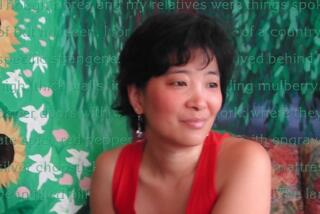Why Celeste Ng calls her new novel, ‘Our Missing Hearts,’ ‘scarily real’
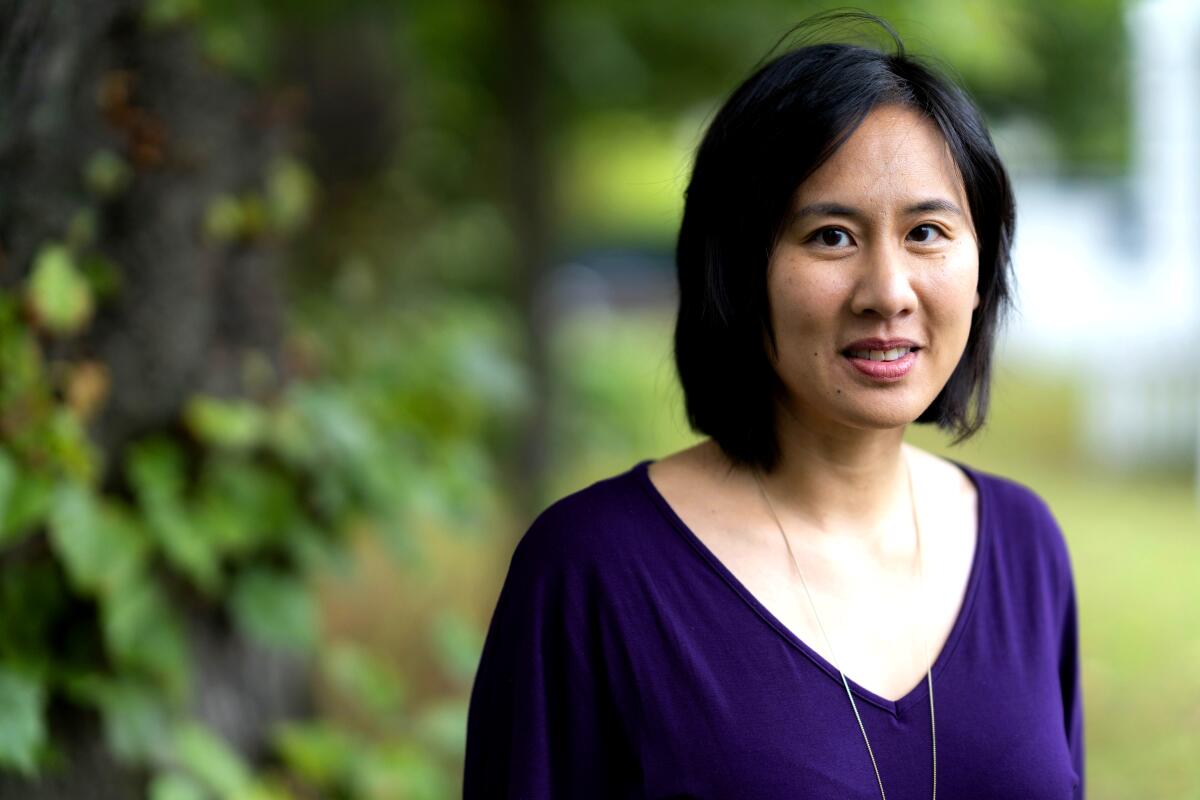
Celeste Ng’s new novel, “Our Missing Hearts,” may feel like a departure to the legions of fans who read her first two books, but the bestselling author does not see it that way.
Ng’s latest work is set in a near future where racism is officially sanctioned, freedom of expression is banned and parents live in fear that their children could be “re-placed” with other families at the first hint of disobedience. It’s a far cry from the very recognizable Midwest suburban settings of Ng’s debut, “Everything I Never Told You,” and her blockbuster sophomore effort, “Little Fires Everywhere.”
The switch to speculative fiction “sounds really different,” Ng acknowledges in an interview. “And yet, how dystopian is it? And I think that’s what most readers are finding. The common thing that I’ve been hearing, in little bits from Twitter or from reader emails, is that it’s not actually that dystopian. It feels scarily real.”
Ng joins the Los Angeles Times Book Club on Dec. 8 to discuss “Our Missing Hearts” with Times columnist Patt Morrison.
There is no pandemic in “Our Missing Hearts,” but an economic crisis has ushered in an authoritarian era, including the bipartisan passage of PACT, the Preserving American Culture and Traditions Act, which legitimizes racism and outlaws dissent.
The novel follows a 12-year-old boy named Bird as he awakens to the injustices of his world and sets off on a journey to find his Chinese American mother, Margaret Miu, a poet-activist driven into hiding. Bird’s father, Ethan, is a white former linguistics professor who ekes out an existence shelving books in the college library. He tries to protect his son by disavowing his wife, burning all his books except for dictionaries, and generally keeping his head down.
Ng did not originally plan to write a dystopia. After “Little Fires Everywhere,” which was adapted into a widely watched Hulu series, she began thinking about another book exploring some of the same family themes, including the relationship between an artistic mother and her adolescent child. Then, the 2016 presidential election happened.
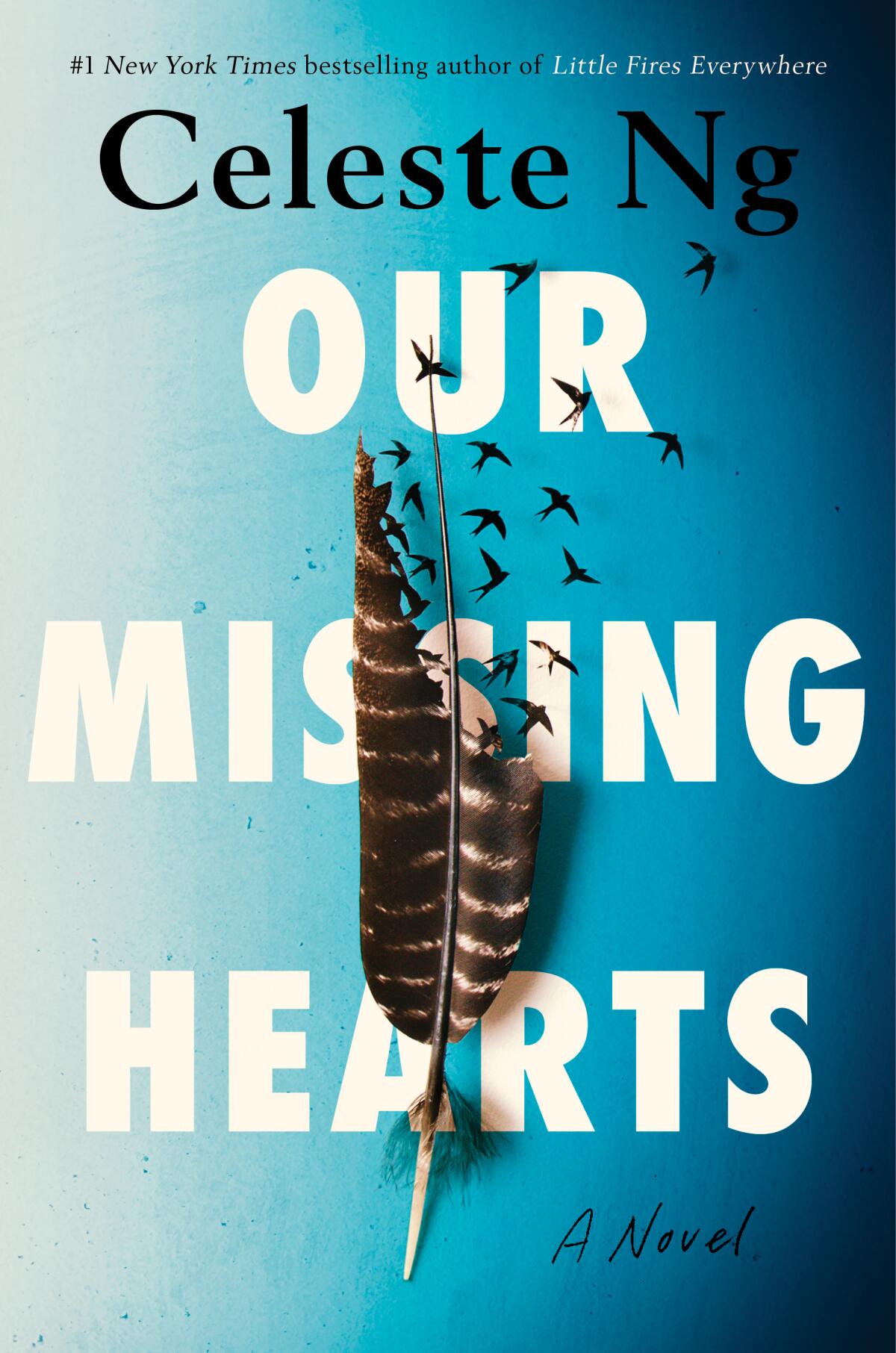
“We’d been seeing the rise of the far right for some time — that was already present, certainly before the election,” Ng says. “But when the outside world started to feel like it was a dystopia, it felt really strange to me to be imagining this nice little world in the book in which none of that was happening. And so, I felt like, let me lean into this and see what happens.”
Ng says she explored a lot of speculative fiction as she worked on the novel, including genre classics such as “The Handmaid’s Tale” by Margaret Atwood and “Fahrenheit 451” by Ray Bradbury. She also read more contemporary works, including Colson Whitehead’s zombie novel “Zone One” and Leni Zumas’ “Red Clocks,” a 2018 novel that imagines an America where abortion is banned and embryos have constitutional rights.
“Like a good writing nerd, I did my homework,” Ng says. “I’d never written anything that wasn’t strictly realist. I was thinking, well, how do I do this? How do I create a world?”
Race plays a major role in “Our Missing Hearts,” as it did in her first two novels. It’s an important issue for the 42-year-old Chinese American author, whose parents emigrated from Hong Kong and raised her in Pittsburgh and Shaker Heights, Ohio.
“There’s been a long history of leaving Asians out of the discussion of race,” Ng says. “Asians have been seen as being sort of white-adjacent or closer to white. There’s a sense that well, they’re diverse, but they’re the safe kind of diversity, right?”
Celeste Ng’s new novel, ‘Our Missing Hearts,’ follows a boy named Bird in search of his mother after the U.S. has become a xenophobic police state.
Even many Asian Americans, Ng says, are unaware of the long history of oppression and brutality directed at Chinese Americans, Japanese Americans and other groups in incidents often treated as footnotes in American history. “I’m still learning a lot about it myself.”
The COVID-19 pandemic, which began as Ng was working on the book, made anti-Asian hatred impossible to ignore. A devastating, unprovoked attack on an Asian American woman in Manhattan is one of many incidents in “Our Missing Hearts” that gives the book a ripped-from-the-headlines quality.
“It was interesting to me that it took a lot of people by surprise, the rise in anti-Asian violence at the beginning of the pandemic,” Ng says. “Growing up as a Chinese American in non-Asian parts of the country, there’s never been a time when I wasn’t aware that hostility might be coming my way. I think that’s a hard thing to admit, and it’s a hard thing for a lot of people to hear.”
Like her fictional poet heroine, Ng has a white husband and a biracial son, about the same age as Bird, and she thinks a lot about how parents — especially mothers — balance their own desires and goals with the responsibilities of raising a child.
Ng’s own mother was a research chemist who completed her PhD and postdoctoral studies while raising a young family with her husband, a NASA physicist. “The farther into parenting I get, the more I look back on my relationship with my mother and try to imagine what she must have been juggling,” Ng says. “I have a renewed respect and profound admiration for the fact that she was trying to balance all of that.”
Ng’s latest work has become another critical success and bestseller. Described as “stunning” by Times reviewer Bethanne Patrick, the book has been on the Los Angeles Times and New York Times bestseller lists since its publication in October. Amazon recently named “Our Missing Hearts” one of the year’s top 20 books.
Ng’s success as a bestselling author of literary fiction has given her a platform that she uses to champion her favorite causes, including the need for racial justice and for more diversity in publishing.
Working with a nonprofit organization called We Need Diverse Books, Ng helps fund publishing internship grants for people who may not be able to afford the typically low wages some of these positions offer. Ng herself worked briefly in publishing before she went on to pursue a career writing fiction. But she says she was only able to accept internships because her parents helped pay her rent as well as her tuition at Harvard, where she studied English as an undergraduate before going on to study creative writing at the University of Michigan.
“We talk a lot about people needing to tell different kinds of stories, which I think is really important,” Ng says. “I’ve been very fortunate that I had people behind the scenes who also thought that, and who would champion me. So I’ve been thinking that one of the things we really need when we talk about adding diversity to the publishing world is not just on the writer end, but actually at every step of the process.”
She also loves to advocate for small booksellers, and recently was named the American Booksellers Assn.’s inaugural Indie Bookstore Ambassador. Speaking in a Zoom interview from her chilly home office in Cambridge, Mass., Ng proudly showed off a sweatshirt from Loyalty, a Washington, D.C., bookstore where she recently made an appearance.
“If I’m within like a hundred feet of a bookstore, I will just get sucked in,” she says. “My family actually will not go to the bookstore with me now unless we set a very firm time limit on when I will leave the bookstore.”
Given the heavy book tour schedule for her latest novel, including talks in Germany and weeks crisscrossing North America, Ng said she is giving herself “official permission” to take time off to “read and think and knit” before she settles on an idea for her next book.
At the same time, Ng is working with A-Major Media and Annapurna Pictures to develop her first novel, “Everything I Never Told You,” into a limited series for Apple TV. Originally, the book was optioned as a feature film, but Ng’s experience in Hollywood has taught her that projects often travel a long and winding road from page to screen.
“There’s so many moving pieces,” she says. “Everybody has to agree to the same thing at the same time, at the same pace. I’m kind of amazed that anything actually gets made.”
Ng also is exploring adaptation options for “Our Missing Hearts.” “Hopefully we’ll have some news to share on that front in the near future,” she says.
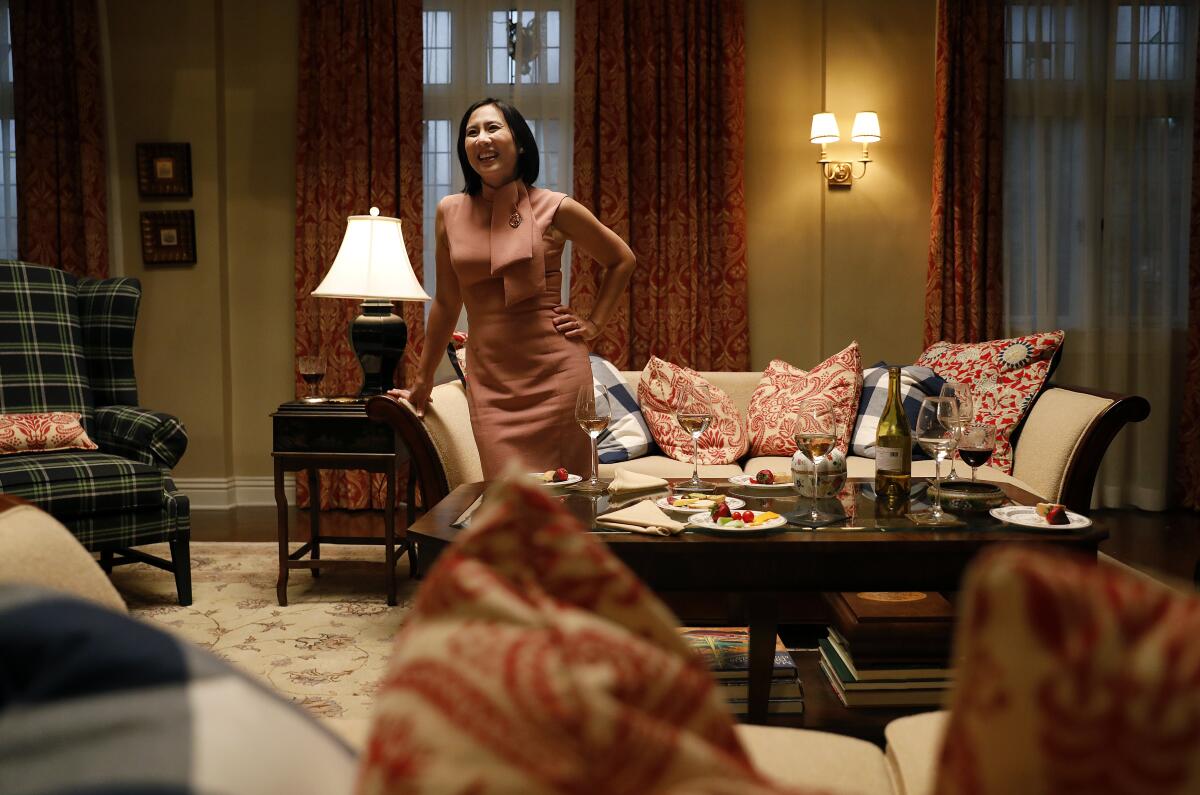
The novelist has nothing but good things to say about her experience working on “Little Fires Everywhere,” which included a cameo appearance in a book club scene, where she was dressed in a ‘90s-era mauve fitted dress. The Hulu series, which starred Reese Witherspoon and Kerry Washington as two very different suburban mothers, included several plot twists that differed from the novel.
“I like adaptations best, and I think they work best, when they’re given a long leash — they’re given some space to become their own thing,” she says. “And, you know, I have to admit that in my mind now, when I think of the two characters, I do think of those two actors as well — even in my own book. They’re these kind of ghosts hovering over them, and that’s not a bad thing.”
Wolk is a Seattle writer who previously worked for Reuters and MSNBC.com.
Book Club: If You Go
What: Novelist Celeste Ng joins the L.A. Times Book Club to discuss “Our Missing Hearts” with columnist Patt Morrison.
When: Dec. 8 at 6 p.m. Pacific.
Where: Live streaming online. Sign up on Eventbrite.
Join us: Sign up for the book club newsletter for latest news and events.
More to Read
Sign up for our Book Club newsletter
Get the latest news, events and more from the Los Angeles Times Book Club, and help us get L.A. reading and talking.
You may occasionally receive promotional content from the Los Angeles Times.
